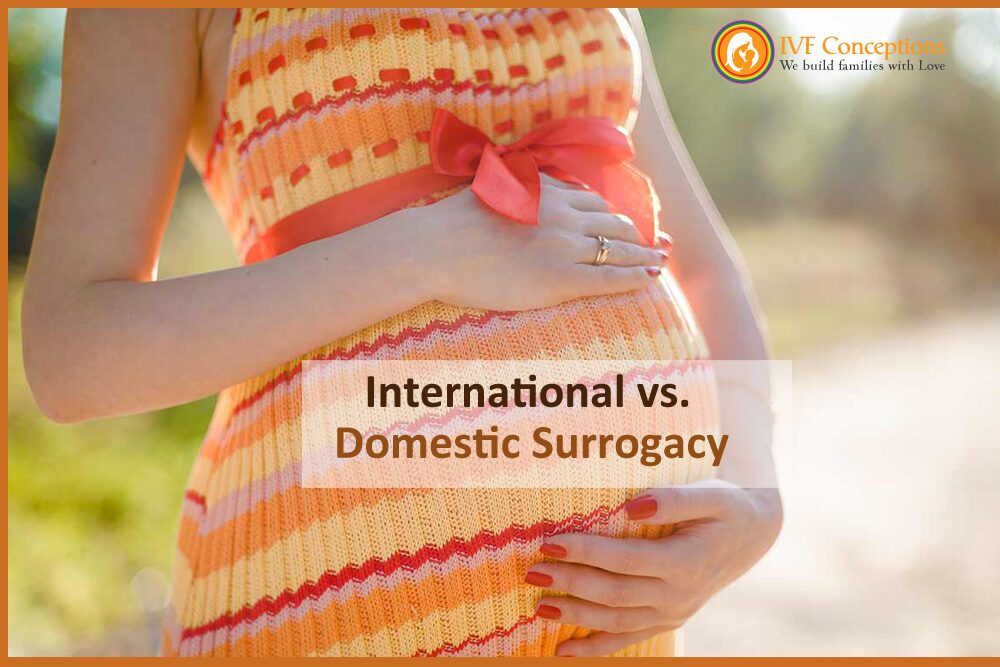How Much Does a Surrogate Make? A Complete Breakdown of Surrogate Compensation

Surrogacy is a rewarding journey for many women who help intended parents achieve their dream of starting or expanding their families. But aside from the emotional fulfillment, a crucial question often arises: How much does a surrogate make?
While the compensation for surrogacy can vary depending on several factors such as location, experience, and whether the surrogacy is traditional or gestational, surrogates can earn a significant sum for their commitment and effort. This blog post provides an in-depth look at surrogate compensation, what it covers, and factors influencing the total payment.
Many couples around the world are unable to conceive naturally or with the help of infertility treatments. Some of these couples consider various alternative Assisted Reproductive Techniques (ART) to conceive.
The two most common types of techniques are – IUI and IVF. These help many couples to conceive. However many couples are unable to conceive even after going for these techniques due to some deeper medical issues due to high medical risks or if the uterus of the woman is damaged or missing. All these conditions make the couple disqualified from going for IVF and IUI.
Get in touch for a Free Surrogacy Consultancy:
📲 +91-8800481100 ( WhatsApp, Line, Viber)

How Much Do Surrogates Make? The Basic Breakdown
The average compensation for a surrogate in the United States ranges from $40,000 to $70,000 or more, depending on the surrogate’s experience, the location of the surrogacy, and the specifics of the surrogacy agreement.
Here’s a general breakdown of surrogate earnings in different regions:
| Location | Average Compensation |
| United States | $40,000 – $70,000 |
| Canada | $25,000 – $45,000 (expenses only) |
| Mexico | $20,000 – $35,000 |
| Colombia | $20,000 – $30,000 |
| Ukraine | $15,000 – $25,000 |
| Georgia | $15,000 – $25,000 |
The exact amount a surrogate makes can also depend on her previous surrogacy experience. First-time surrogates usually receive lower compensation than experienced surrogates.
 Surrogate mother compensation refers to the financial payment provided to surrogates for their participation in the surrogacy process.
Surrogate mother compensation refers to the financial payment provided to surrogates for their participation in the surrogacy process.
Surrogacy involves a woman, carrying a pregnancy on behalf of another person or couple, known as the intended parents, who are unable to conceive or carry a child themselves.
The amount of compensation for surrogates can vary based on several factors. Surrogate compensation packages often include base pay, which is the primary component of the financial arrangement.
This base compensation takes into account the surrogate’s location, level of experience, and other relevant factors. Surrogates in high-demand areas may receive higher compensation
More resources for questions about surrogate compensation:
How much does surrogacy cost a friend?
All you need to know about surrogate mother payment?
 How surrogate mother’s payment is calculated?
How surrogate mother’s payment is calculated?
Surrogate Compensation: Understanding Payment for Surrogacy
Surrogates are paid generous amounts for their time and effort. The agency is usually always truthful and clear in addressing this question and eager to clarify it.
How much money a gestation carrier is paid may depend on many conditions, including medical measures, in which state the surrogate stays, and her past surrogate experience.
If you are considering becoming a gestational carrier, it is advised to contact a surrogacy professional near you to advise and guide you for the specific case. Surrogate pay is higher in some states like California ( where surrogates are in high demand)and surrogates may be paid slightly more in the case of repeat surrogates,
Components of Surrogate Compensation
Surrogate compensation isn’t just a flat fee. It includes various payments and reimbursements that reflect the time, effort, and physical toll surrogacy entails. Here’s a detailed look at what is typically included:
a. Base Compensation
The base compensation is the primary payment made to a surrogate. This amount can vary but is typically between $40,000 and $50,000 for first-time surrogates in the U.S. Surrogates with experience may earn up to $70,000 or more.
b. Monthly Allowance
Surrogates receive a monthly allowance during the pregnancy to cover incidental expenses like maternity clothing, childcare, or transportation for doctor’s appointments. The typical monthly allowance ranges from $200 to $500.
c. Medical and Health Care Expenses
All medical costs related to the surrogacy, including fertility treatments, prenatal care, and delivery, are covered by the intended parents. Surrogates also receive a health insurance plan if they do not already have one, or the intended parents pay out-of-pocket for pregnancy-related costs.
d. Additional Compensation (Bonuses)
Surrogates may be eligible for additional compensation for specific circumstances, including:
- Multiples Compensation: Surrogates who carry twins or triplets usually receive extra compensation, ranging from $5,000 to $10,000.
- C-section Compensation: If a C-section is required, surrogates may receive an additional $2,500 to $5,000.
- Mock Cycle Fees: If the surrogate undergoes a mock cycle to prepare her body for the pregnancy but doesn’t proceed with embryo transfer, she may receive a fee of $500 to $1,000.
- Invasive Procedure Fees: Compensation is given for invasive procedures like amniocentesis or selective reduction, typically ranging from $1,000 to $3,000.
e. Travel Expenses
If the surrogate needs to travel for medical appointments, embryo transfers, or delivery, intended parents cover all travel-related costs. This includes airfare, accommodation, meals, and transportation.
f. Legal Fees
Surrogates are provided with a legal team to ensure their rights are protected. All legal fees related to the surrogacy agreement are paid for by the intended parents.
Factors Affecting Surrogate Pay
Surrogate compensation varies based on several key factors:
| Factor | Influence on Compensation |
| Location | Surrogacy rates differ by region and country. For example, surrogates in the United States often receive higher compensation compared to some other countries. |
| Experience | Experienced surrogates may receive higher pay, reflecting their previous successful surrogacy journeys. |
| Agency or Independent | Surrogates working with agencies may receive a structured compensation package, which can include a base fee, plus additional payments for specific milestones and expenses. Independent surrogates may negotiate their compensation directly with the intended parents. |
| Number of Pregnancies | Surrogates carrying multiple pregnancies for the same intended parents may receive higher compensation for the added medical and emotional demands. |
| Medical Expenses | Surrogates typically do not have to cover medical expenses, as these are usually paid for by the intended parents. |
| Miscellaneous Expenses | Surrogates often receive additional compensation for expenses such as maternity clothing, travel, childcare, and more. |
The payment is divided into 3 categories – based compensation, surrogacy expenses, and other costs.

How Much Does a Surrogate Make?
#1. Surrogate Base Compensation (paid monthly)
Becoming a Surrogate Mother: Compensation and Rewards
The compensation offered to surrogates can range from $40,000 to $75,000 or more, depending on factors such as location, experience, and the specific agency or program involved.
Surrogates are paid by the intended parents. The base compensation of a surrogate mother starts from $35,000 to $50,000. This does not have to be used for maternity and health expenses; this is a different provision for broad financial intervention. Based on the experience and other considerations, the compensation differs such as:
- Your experience: Typically, an experienced lady gets an additional $5,000 per pregnancy.
- Her state of residence: In a friendly state like California there is a great requirement for as friendly surrogacy laws to attract more intended parents.
Basic compensation is usually paid in 10 equal installments throughout the surrogacy process, starting with heartbeat confirmation around six weeks. Your surrogate must work closely with an escrow company to ensure that they collect their payments if they have a right to them.
#2. Coverage of surrogacy-related cost
Surrogate Compensation Packages: What to Expect
In addition to obtaining a monthly insurance allowance, the planned parents pay for all expenses associated with surrogate services. A gestational carrier already spends a lot of time and resources in surrogacy and is not required to contribute financially. If you are a surrogate, you do not incur any costs related to the surrogacy process as intended parents cover surrogacy costs, including:
- Health costs — Insurance premiums, co-pays, supplements, and more. medical expenses.
- Legal costs — your own legal advice and contract writing.
- Expenditure on travel — airfare, lodging, car rental, school, nursery, etc.
#3. Additional Compensation
In addition to base pay, surrogate compensation may include various benefits and allowances. These benefits can cover lost wages associated with time away from work, maternity clothes, start medication fees, travel expenses, insurance premiums, and other related costs.
The specific benefits and their amounts may vary depending on the surrogacy agency and the contractual agreement between the surrogate and the intended parents.
We know that every path is different for the surrogate and that is why you and your surrogate specialist often decide surrogacy payments. Your surrogacy agency will work with you to determine the best compensation rate for your requirements and preferences.
It is quite possible to have unexpected incidents that can occur during your surrogacy journey, so there is a possibility of additional compensation. Situations like ending a pregnancy, breast milk pumping, intrusive operations, and much more would allow you to obtain an additional surrogacy allowance.
Typically, the basic payment starts from $35,000. However, her actual pay-out varies depending on geographical area, past experience, and medical insurance.
- Geography: There is a greater demand in certain countries and/or better legislation for surrogacy jobs. California, for example, is the highest-paid replacement territory.
- Experience: Experience carrier typically claims $5,000 more – slightly higher charges.
- Surrogate medical insurance plan: If she has insurance that covers the pregnancy and birth, then she must be paid more.
Surrogate may charge contingency fees for birth circumstances, in addition to standard compensation. For example, for having a C-section, carrying twins, and having procedures such as amniocentesis she will get extra money. The intended parents would probably deal in a surrogacy contract with contingency details.
- Surrogate compensation in the USA is in a range of $35,000 to $55,000 based on the state she lives.
- Surrogate compensation in Georgia, Ukraine, and Latin American countries varies from $15,000 to $20,000
Additional guides for how much do surrogate moms make;
How to find a surrogate mother?
In which country I can find low-cost surrogate mothers?

Average Surrogate Compensation
The compensation for surrogates can vary significantly, but here’s a general overview of what to expect:
- Base Fee: This typically ranges from $30,000 to $50,000 or more in the United States, depending on location and experience.
- Additional Milestone Payments: Surrogates may receive extra payments for reaching specific milestones during the surrogacy journey, such as successful embryo transfer.
- Miscellaneous Expenses: These can add up to several thousand dollars, covering maternity clothing, travel, childcare, and other related costs.
- Medical Expenses: Intended parents usually cover all medical expenses, including prenatal care, delivery, and postpartum care.
- Compensation for Multiples: Surrogates carrying twins or triplets may receive a higher fee due to the increased demands on their bodies and time.
Legal and Ethical Considerations
It’s important to emphasize that surrogacy compensation should not be seen as “making money” but rather as fair compensation for the time, effort, and sacrifices made by surrogates. Legal and ethical guidelines govern surrogacy to ensure the well-being of all parties involved.
Surrogacy contracts typically outline compensation details, expectations, and responsibilities to protect both the surrogate and intended parents.

Why Surrogates Choose Surrogacy Beyond Compensation
It’s important to note that while the financial benefits of surrogacy are significant, most women don’t become surrogates solely for the money.
The vast majority of surrogates cite a desire to help childless couples or individuals create families as their primary motivation. Many surrogates enjoy pregnancy and see surrogacy as a way to give back, knowing they are making a life-changing difference for others.
Surrogacy also requires lifestyle sacrifices, emotional resilience, and a strong commitment to the intended parents. Surrogates need to make significant lifestyle adjustments, follow medical protocols, and undergo regular medical checks throughout the pregnancy.
Surrogate Agencies and Compensation
Most surrogates work through an agency, which helps facilitate the process from matching to compensation. Agencies generally provide the following support:
- Surrogate Screening: Surrogates undergo medical and psychological evaluations to ensure they are mentally and physically fit for the process.
- Matching: Agencies match surrogates with intended parents based on their preferences, values, and expectations.
- Payment Distribution: Agencies handle the distribution of surrogate compensation, ensuring that surrogates are paid on time and fairly.
 FAQs for how much surrogates make
FAQs for how much surrogates make
1. How much do surrogates get paid?
Surrogate compensation varies based on several factors such as location, experience, and the specific arrangements made with the intended parents. On average, she can receive a base compensation ranging from $30,000 to $40,000, with additional reimbursements for lost wages, medical procedures, and other expenses.
2. What is included in a surrogate’s compensation package?
A surrogate mother’s compensation package typically includes the base pay, which is the primary compensation for carrying the pregnancy, as well as additional reimbursements for medical screenings, fertility treatments, maternity clothes, and travel expenses. It is important to discuss the compensation breakdown with the surrogacy agency or intended parents to have a clear understanding of what is covered in the package.
3. How much does a gestational surrogate earn?
The earning potential of a gestational surrogate can vary, but they can expect to earn a base compensation of around $30,000 to $40,000, depending on various factors. Additional reimbursements and compensations may also be provided as part of the overall compensation package.
4. Are surrogates paid differently based on experience?
Yes, experienced surrogates who have successfully completed previous surrogacy journeys are often paid more than first-time surrogates. This recognizes the additional expertise and experience they bring to the process.
5. How is the base compensation for a surrogate determined?
The base compensation for a surrogate is usually determined based on the specific arrangements made with the intended parents and the surrogacy agency. Factors such as location, demand for surrogates, and local cost of living may also influence the base pay.
6. Do surrogates get paid for lost wages?
Yes, surrogates usually receive reimbursements for lost wages during the surrogacy journey. These lost wages are typically calculated based on the surrogate’s regular income and the time they need to take off work for medical appointments, pregnancy-related restrictions, and recovery.
7. Who covers the medical expenses during the surrogate pregnancy?
The intended parents are responsible for covering the medical expenses related to the surrogate pregnancy. This includes costs associated with fertility treatments
 Conclusion
Conclusion
In conclusion, surrogate compensation plays a crucial role in recognizing dedication and sacrifices. The base compensation, additional expenses, and milestones throughout the surrogacy journey ensure that surrogates are supported financially and emotionally.
Each surrogacy arrangement is unique, and the details of surrogate compensation are typically negotiated and outlined in a surrogacy contract between the surrogate and the intended parents.
If you’d like to learn more about IVF, Egg Donation, or surrogacy services globally, check out the rest of our website: IVF Conceptions. We offer legally secure and affordable surrogacy consulting services for FREE.
Get in touch for a Free Surrogacy Consultancy:
📲 +91-8800481100 ( WhatsApp, Line, Viber)
Reference used:
American Society for Reproductive Medicine

 How surrogate mother’s payment is calculated?
How surrogate mother’s payment is calculated? FAQs for how much surrogates make
FAQs for how much surrogates make Conclusion
Conclusion